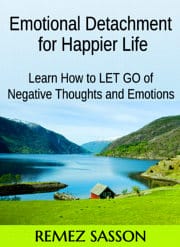
First Part – Discover Non-Duality: A Comprehensive Guide to Transcending Dualism
Second Part – Understanding the Illusion of Separation Between You and the Universe
After reading the two articles about non-duality, “Discover Non-Duality: A Comprehensive Guide to Transcending Dualism” and “The Illusion of Separation Between You and the Universe”, you might still have questions. For this reason, we have compiled a few questions you might ask and provided the answers.
You can also find more articles on this topic on our website:
What Is Nonduality? Definition and Meaning
Nonduality, Non-Dualism and Duality: Information in Simple Words
Questions and Answers About Non-Duality
The best way to understand nonduality is to practice it and live it. It might seem complicated, but it is not. It is very simple and straightforward.
Living in nonduality requires a focused mind and the ability to delve within oneself and observe one’s thoughts with detachment. Concentration exercises, meditation, mindfulness, reading about nonduality, and, if possible, learning from nonduality teachers are very helpful practices.
What Is Non-Duality?
Q: Can you define non-duality in spiritual terms?
A: Non-duality is a concept in spirituality that suggests there is no true division or separation between the divine, the self, and all of existence. It is a viewpoint that goes beyond dichotomies such as subject versus object or self versus other.
Non-Duality in Buddhism
Q: How is non-duality described in simple terms within Buddhism?
A: In Buddhism, non-duality is expressed through the concept of “Shunyavada” or the teachings of the Madhyamaka school, which posits that there is no absolute separation between the conventional and ultimate truths, as well as between the cycle of life and death (samsara) and enlightenment (nirvana).
Non-Duality in Various Traditions
Q: Which Paths incorporate the belief in non-duality?
A: The belief in non-duality, or the idea of “not two,” indicating no separation between entities, is central to several spiritual and philosophical traditions, including Hinduism, Buddhism, and Taoism. These traditions often emphasize concepts of unity, oneness, and interdependence.
Famous Teachers of Non-Duality
Q: Who are some of the well-known teachers of non-duality?
There are many teachers of nonduality, but some are more well-known and considered great spiritual teachers.
Adi Shankara was a prominent philosopher and theologian who lived in India during the 8th century CE. He is credited with establishing the Advaita Vedanta school of Hindu philosophy.
Ramana Maharshi was a well-known guru and spiritual teacher who lived and taught in southern India.
He was born in 1879 near Madurai, Tamilnadu, India, and spent most of his life in Tiruvannamalai, where he arrived at the age of seventeen.
Sri Ramana Maharshi recommended self-inquiry as the principal means to remove ignorance and abide in Self-awareness, together with bhakti (devotion).
Nisargadatta Maharaj, an Indian spiritual teacher and philosopher, left an indelible mark on the world with his profound teachings on self-realization and non-dual awareness.
Born in 1897 in Bombay, Maharashtra, Maharaj’s spiritual journey and teachings continue to inspire seekers of truth and liberation.
Sri H. W. L. Poonja, known as Papaji, was born in Punjab on 13 October 1910. He was a teacher of Self-enquiry, and for some time, he was a disciple of Sri Ramana Maharshi, the renowned Indian sage.
Understanding Dualism vs. Non-Duality
Q: What distinguishes dualism from non-duality?
A: Dualism and non-duality are contrasting concepts. Dualism refers to the existence of two separate realities: pure awareness, which is constant and non-material, and nature.
Non-duality, on the other hand, is the recognition of interconnectedness and oneness, suggesting that such separations are not fundamental.
Practicing Non-Duality
Q: How can one practice non-duality in everyday life?
A: Practicing non-duality involves daily meditation to become accustomed to a non-dualistic mindset and observing the world with a sense of wonder and without immediate labeling or judgment, as if seeing things for the first time.
The Non-Duality Paradox
Q: What is the paradox of non-duality?
A: Non-duality presents a paradox by challenging the conventional dualistic way of thinking, which categorizes reality into opposites like good versus bad or self versus other. Non-duality suggests that such distinctions are ultimately illusory, and reality is fundamentally unified.
First Part – Discover Non-Duality: A Comprehensive Guide to Transcending Dualism
Second Part – Understanding the Illusion of Separation Between You and the Universe


